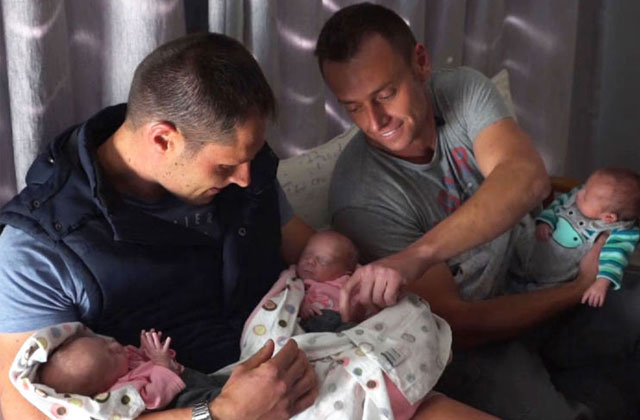
South Africa’s First Triplets Born with BOTH Dads’ DNA
Triplets born to a gay couple from Pretoria have made medical history in South Africa by being the first recorded triplets to be born with two fathers’ DNA. Theo and Christo Menelaou each fertilised one egg of a surrogate mother. One of those eggs split, creating identical twins, and resulting in the surrogate giving birth […]

Triplets born to a gay couple from Pretoria have made medical history in South Africa by being the first recorded triplets to be born with two fathers’ DNA.

Theo and Christo Menelaou each fertilised one egg of a surrogate mother. One of those eggs split, creating identical twins, and resulting in the surrogate giving birth to triplets. Doctors had advised the couple to terminate two of the foetuses but, together with the surrogate mom, they decided to go ahead.
Christo told Sky News: “When you are gay, there is always the thought that it just may not be possible to be a parent no matter how much you would love to be…
“It’s very hard to be accepted for adoption and we were told we would always come after heterosexual couples. And then we just never thought we’d ever find a person who would want to be surrogate to a gay couple.”
The two dads met the surrogate mother at a neighbourhood meeting during former Olympian Oscar Pistorius’ trial. Pistorius was their neighbour and friend.
The babies – Zoe, Kate and Joshua – were premature, born at 31 weeks in July, and weighing just over a kilogram each… but after a few weeks in Sunninghill Hospital, Johannesburg, they were brought home to Pretoria. One will require heart surgery later this year, and they are wearing breathing apparatus so they can be constantly monitored for now.
Although this is definitely the first recorded medical case in South Africa of a same-sex couple both being biological fathers to their triplets, a similar set of triplets were born to a gay couple in the USA on 28 June, according to the New York Daily News. (Btw – no child shares both dads’ DNA… although this will apparently be possible with medical breakthroughs in the future.)